Juho Pohjalainen's Blog: Pankarp - Posts Tagged "magic-systems"
Rule Number One of Magic: There Are No Rules
Or to be perhaps a little less blunt and poetic... the rules for magic come from within, not without.
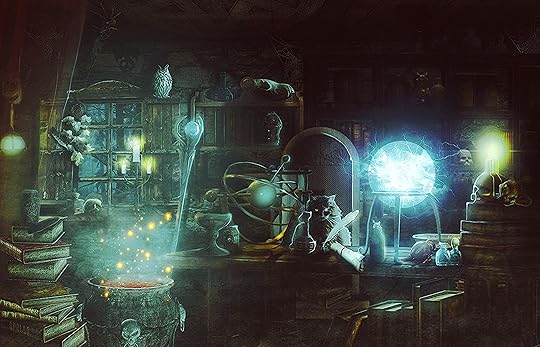
Great many fantasy writers, especially nowadays, love to develop complex magic systems, fancy and impressive and well-explained, spending a lot of time and pages to describe the way the wizard tosses the runestones or sings the song or speaks the true name or what have you. And I never saw the point in this sort of a thing: it may seem like an attractive course of action on the surface, to flesh out and expand the most magical and fantastic thing in your world, to show the reader just how things work there and how it's different from our own mundane life... but what you're really doing is, you're wasting a great deal of time and effort and the reader's attention to make your world less magical.
You're taking things that should be Unknown, and making them Known. You're turning the Magic into Science: the kind of science that's quite impossible for us in real life to do, but science nonetheless. From the narrative standpoint, what really is the difference between tapping into the energies of the Wyrd (or whatever) that exists parallel to your world and that all magic is fueled by, then wriggling your fingers the right way, snapping your thumb and forefinger to create the spark, in order to cast the Fireball spell to burn your enemies – and pulling the trigger of your flamethrower to shoot the fuel out through the burning nozzle?

There is no difference.
This was a fairly exaggerated example, many of the magic systems rarely true to such extent, but you get the point. Each fact established about magic as a whole – where the magical energy comes from, whether wizards throw down runes or play music or whatever to create effects with it, how different runes or instruments or what have you play off of one another, etc. – binds it more and more to common reality, dulls out the fantasy and wonder, makes it more logical and understandable and predictable, cages it. Magic should fly free.
So, I avoid making such generalizations to the last: I never tell how all magic everywhere works. Instead, I tell how this one guy's magic works. This has numerous advantages for me:
First, I tend to enjoy character-based stories, rather than setting-based, so this keeps the priorities in the correct order. To develop some character's inidividual magical style, is to develop the character.
Second, it maintains the sense of wonder. You may know how this guy works his magic, but you have no idea how the next guy does it: each time you meet another wizard you'll have something to look forward to.
Third, it still binds them to the narrative with personal rules and limitations. To take the above Fireball example, one wizard may cast it with a wand made out of specific kind of wood, with specific kind of runes written in it; another one might cast it by yelling out a Sick Burn. If you want to defend yourself against the former guy, or to add narrative tension about his survival, snap his wand; to do the same for the latter, gag him.
You see a demonstration of this early on in The Straggler's Mask, where two wizards take out their wands and commit to a terrible and destructive arcane duel. Their different philosophies and powers are at the forefront the entire time:

(Incidentally, I'm really not a fan of how so much of magic art is so full of flash and color and lightning and other special effects. But that's a blog post for another day.)
The old man Melker has spent all his long life in formal theoretical study of the arcane, learning his art slowly and methodically from scrolls, grimoires, and sorcerers even older and wiser than himself. A common magic system is to attribute magic to a language, but here we take this approach to the extreme: to such logical and methodical sorcerers, every individual spell is a language of their own. You don't just learn the language of magic in general. You learn the language of Fireball. And you better learn it well before starting to fling the spell around, or else you might embarrass yourself by casting something stupid, and you'll always have an accent no matter what you do. (Going with this method, Ziad Fazah would be a legendary archmage!) Melker may have only a few spells, but he's had a long time to become fluent with each of them, casting them with practiced and precise competence and surprising flexibility.
The demonic witch-girl Rime, on the other hand, has no patience for such bullshit, and instead learned her art from the lips of demons and spirits. Their whispers don't involve much about the nitty-gritty details of whatever spells they taught her, rather just how to get things done quickly and efficiently. She is consequently extremely powerful for her age, having learned a lot of things very fast... but not necessarily very well. Virtually all of her magic comes with a heavy cost, whether material or spiritual or physical, or risk doing great deal more harm to her surroundings than she'd wish it to, or involve constantly maintained pacts and complex diplomacy with summoned demons and monsters. She wields it all with relentless, burning rage – she is at a constant risk of being destroyed by things she doesn't understand, but she's going to take a chunk of the world with her.
And they are only two. You can bet that every other wizard in the setting will have their own way of doing things. None of them truly know where the magic comes from, if indeed it all comes from the same place at all – some of them have theories, beliefs, but I'll never make the mistake of telling you which one is right.
There is one constant rule, I suppose, but it's not really a rule with magic as with everything in this world or theirs: all knowledge or power worth possessing is going to take a great deal of effort, time, or other cost to acquire. If you feel that something came too easy for you, then odds are good you haven't truly acquired it, and that it's going to do you far more harm than good.


Great many fantasy writers, especially nowadays, love to develop complex magic systems, fancy and impressive and well-explained, spending a lot of time and pages to describe the way the wizard tosses the runestones or sings the song or speaks the true name or what have you. And I never saw the point in this sort of a thing: it may seem like an attractive course of action on the surface, to flesh out and expand the most magical and fantastic thing in your world, to show the reader just how things work there and how it's different from our own mundane life... but what you're really doing is, you're wasting a great deal of time and effort and the reader's attention to make your world less magical.
You're taking things that should be Unknown, and making them Known. You're turning the Magic into Science: the kind of science that's quite impossible for us in real life to do, but science nonetheless. From the narrative standpoint, what really is the difference between tapping into the energies of the Wyrd (or whatever) that exists parallel to your world and that all magic is fueled by, then wriggling your fingers the right way, snapping your thumb and forefinger to create the spark, in order to cast the Fireball spell to burn your enemies – and pulling the trigger of your flamethrower to shoot the fuel out through the burning nozzle?

There is no difference.
This was a fairly exaggerated example, many of the magic systems rarely true to such extent, but you get the point. Each fact established about magic as a whole – where the magical energy comes from, whether wizards throw down runes or play music or whatever to create effects with it, how different runes or instruments or what have you play off of one another, etc. – binds it more and more to common reality, dulls out the fantasy and wonder, makes it more logical and understandable and predictable, cages it. Magic should fly free.
So, I avoid making such generalizations to the last: I never tell how all magic everywhere works. Instead, I tell how this one guy's magic works. This has numerous advantages for me:
First, I tend to enjoy character-based stories, rather than setting-based, so this keeps the priorities in the correct order. To develop some character's inidividual magical style, is to develop the character.
Second, it maintains the sense of wonder. You may know how this guy works his magic, but you have no idea how the next guy does it: each time you meet another wizard you'll have something to look forward to.
Third, it still binds them to the narrative with personal rules and limitations. To take the above Fireball example, one wizard may cast it with a wand made out of specific kind of wood, with specific kind of runes written in it; another one might cast it by yelling out a Sick Burn. If you want to defend yourself against the former guy, or to add narrative tension about his survival, snap his wand; to do the same for the latter, gag him.
You see a demonstration of this early on in The Straggler's Mask, where two wizards take out their wands and commit to a terrible and destructive arcane duel. Their different philosophies and powers are at the forefront the entire time:

(Incidentally, I'm really not a fan of how so much of magic art is so full of flash and color and lightning and other special effects. But that's a blog post for another day.)
The old man Melker has spent all his long life in formal theoretical study of the arcane, learning his art slowly and methodically from scrolls, grimoires, and sorcerers even older and wiser than himself. A common magic system is to attribute magic to a language, but here we take this approach to the extreme: to such logical and methodical sorcerers, every individual spell is a language of their own. You don't just learn the language of magic in general. You learn the language of Fireball. And you better learn it well before starting to fling the spell around, or else you might embarrass yourself by casting something stupid, and you'll always have an accent no matter what you do. (Going with this method, Ziad Fazah would be a legendary archmage!) Melker may have only a few spells, but he's had a long time to become fluent with each of them, casting them with practiced and precise competence and surprising flexibility.
The demonic witch-girl Rime, on the other hand, has no patience for such bullshit, and instead learned her art from the lips of demons and spirits. Their whispers don't involve much about the nitty-gritty details of whatever spells they taught her, rather just how to get things done quickly and efficiently. She is consequently extremely powerful for her age, having learned a lot of things very fast... but not necessarily very well. Virtually all of her magic comes with a heavy cost, whether material or spiritual or physical, or risk doing great deal more harm to her surroundings than she'd wish it to, or involve constantly maintained pacts and complex diplomacy with summoned demons and monsters. She wields it all with relentless, burning rage – she is at a constant risk of being destroyed by things she doesn't understand, but she's going to take a chunk of the world with her.
And they are only two. You can bet that every other wizard in the setting will have their own way of doing things. None of them truly know where the magic comes from, if indeed it all comes from the same place at all – some of them have theories, beliefs, but I'll never make the mistake of telling you which one is right.
There is one constant rule, I suppose, but it's not really a rule with magic as with everything in this world or theirs: all knowledge or power worth possessing is going to take a great deal of effort, time, or other cost to acquire. If you feel that something came too easy for you, then odds are good you haven't truly acquired it, and that it's going to do you far more harm than good.

Published on June 08, 2019 16:22
•
Tags:
magic, magic-systems, melker, overdesigning, pet-peeves, rime, rules, science, wizards, worldbuilding
Rule Number Two of Magic: Plenty Magic, Few Wizards
A human mind has always longed to make sense of things - to understand, to quantify, and to bind and take advantage of... or to get rid of what cannot be understood, to destroy or subjugate that which we fear.

For the last generation or so, this sort of thinking has been in vogue in fantasy as well. We now have great many stories where magic is fully understood, wizardry is a common and accepted profession, and fantasy creatures and weird races walk among us; or where all that nonsense has been shunted aside in favour of gritty medieval realism. On the internet message boards - particularly Tumblr - people love to discuss magic and monsters and such things, wonder how exactly they work, seek out loopholes in their behavior and new strengths and weaknesses, or have a good laugh about what happens when their rules are applied to reality in new and ridiculous ways.
For example...

Even that last aspect, about destruction and domination, has found new life in a subgenre called HFY - short for "Humanity Fuck Yeah" - which started out as an attempt to give humans something to be special about in the face of all the aliens and monsters, rather than being the generic Normals, but which many have chosen to interpret as humanity applying their science, intellect, and combat instinct to destroy all the fantastic and weird.

It's not just a yearning to understand, really - it all works in concert with an almost-equal yearning to explain. To show off, to feel smarter than those around us. To describe in great detail how our magic systems work, how well they make sense, and how we've integrated other creatures and monsters and races into the world and how they would change things in society; or, at the opposite end, how much research we've done on the subject of medieval history, technology, sociology, heraldry, and mud. Hell, I myself am far from immune to this: I make one atypical cosmic system and ensuing seasons and weather patterns, and I now find myself wanting to talk about it in every story I write.
I think it all shows an even greater issue we as a species have: when we get an idea that's ostensibly good or beneficial or funny, we exploit the shit out of it. More often than not this results in far more trouble than its worth. We cannot do anything in moderation. As seen here: we want to make sense of stuff, and so we kill fantasy.
Well, it's a slight exaggeration. It's not to say that any such fiction could not be pretty great anyway, or that some of the internet fantasy analyzation isn't really funny and making some curious remarks - it's just that I don't think we should follow such a trend too far, as a general rule, and that we should give a new chance to not understanding everything, and to let the world's own strange logic to carry things for us.
So as I like to do things, there's a lot of magic out there, a lot of fantasy, a lot of mystery - and there's nothing you understand about it on the outset, and very little you understand even after you've had an adventure. Wizards are rare and few, considered powerful and sagacious even when they're relatively weak or ignorant by the standards of most fantasy - each as well-known as kings, and no more common, yet each has only ever glimpsed a little bit of the unknown realm of fantasy. Other races live far away from human realms, at best mysterious and detached in the borderlands where they're sometimes seen, at worst unseen and wondrous, relegated to realm of imagination and fairytale, in the inner lands. The very world, its lands and seas and skies, acts bizarrely and erratically, all too often impossible to predict or defend against, let alone control. The people who have gone to these lands of wonder and returned alive, are venerated by all.
In your little farm, village, or town, things may - indeed should - seem altogether normal and sensible, your immediate surroundings well understood to you and no longer causing you fear... but step out of your door and onto the forest path, and who knows where it will take you and what strange sights will open to you.
That, as I understand it, is Fantasy.
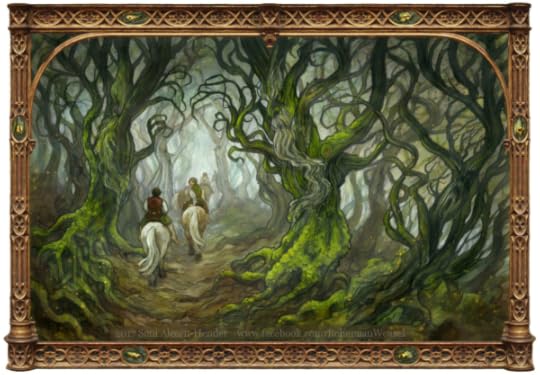

For the last generation or so, this sort of thinking has been in vogue in fantasy as well. We now have great many stories where magic is fully understood, wizardry is a common and accepted profession, and fantasy creatures and weird races walk among us; or where all that nonsense has been shunted aside in favour of gritty medieval realism. On the internet message boards - particularly Tumblr - people love to discuss magic and monsters and such things, wonder how exactly they work, seek out loopholes in their behavior and new strengths and weaknesses, or have a good laugh about what happens when their rules are applied to reality in new and ridiculous ways.
For example...

Even that last aspect, about destruction and domination, has found new life in a subgenre called HFY - short for "Humanity Fuck Yeah" - which started out as an attempt to give humans something to be special about in the face of all the aliens and monsters, rather than being the generic Normals, but which many have chosen to interpret as humanity applying their science, intellect, and combat instinct to destroy all the fantastic and weird.

It's not just a yearning to understand, really - it all works in concert with an almost-equal yearning to explain. To show off, to feel smarter than those around us. To describe in great detail how our magic systems work, how well they make sense, and how we've integrated other creatures and monsters and races into the world and how they would change things in society; or, at the opposite end, how much research we've done on the subject of medieval history, technology, sociology, heraldry, and mud. Hell, I myself am far from immune to this: I make one atypical cosmic system and ensuing seasons and weather patterns, and I now find myself wanting to talk about it in every story I write.
I think it all shows an even greater issue we as a species have: when we get an idea that's ostensibly good or beneficial or funny, we exploit the shit out of it. More often than not this results in far more trouble than its worth. We cannot do anything in moderation. As seen here: we want to make sense of stuff, and so we kill fantasy.
Well, it's a slight exaggeration. It's not to say that any such fiction could not be pretty great anyway, or that some of the internet fantasy analyzation isn't really funny and making some curious remarks - it's just that I don't think we should follow such a trend too far, as a general rule, and that we should give a new chance to not understanding everything, and to let the world's own strange logic to carry things for us.
So as I like to do things, there's a lot of magic out there, a lot of fantasy, a lot of mystery - and there's nothing you understand about it on the outset, and very little you understand even after you've had an adventure. Wizards are rare and few, considered powerful and sagacious even when they're relatively weak or ignorant by the standards of most fantasy - each as well-known as kings, and no more common, yet each has only ever glimpsed a little bit of the unknown realm of fantasy. Other races live far away from human realms, at best mysterious and detached in the borderlands where they're sometimes seen, at worst unseen and wondrous, relegated to realm of imagination and fairytale, in the inner lands. The very world, its lands and seas and skies, acts bizarrely and erratically, all too often impossible to predict or defend against, let alone control. The people who have gone to these lands of wonder and returned alive, are venerated by all.
In your little farm, village, or town, things may - indeed should - seem altogether normal and sensible, your immediate surroundings well understood to you and no longer causing you fear... but step out of your door and onto the forest path, and who knows where it will take you and what strange sights will open to you.
That, as I understand it, is Fantasy.

Published on June 20, 2019 10:07
•
Tags:
creatures, fairy-tales, fantasy, humanity, instinct, magic, magic-systems, pet-peeves, rules, science, wizards, worldbuilding
Rule Number Three of Magic: But At What Cost?
Magic is not free. Wizards cannot just fling their spells around infinitely, all day long. Otherwise the whole concept would soon lose its luster and wonder, render it an easy solution to everything and every time, and either nerf it to little firebolts and other simple replacements to the mundane, or make non-wizards sad.

Maybe they need to lug their thick heavy spellbooks around, flipping through them at a critical juncture to find what they need - and of course having to protect them from being stolen or harmed. Or they need to memorize their spells, and their poor little mortal skulls can only hold so many, putting a hard limit on how many they can cast before rest. Or they need some expensive material components or fuel - even live sacrifice, or the wizard's youth. Or they require complex maintained pacts and deals with things from some other realms. Or keeping an eye on the stars or something. Or maybe it tires them out, like physical exercise would, as the magic runs through their bodies.
Or maybe the magic is wild and uncontrolled, risking chaotic side-effects and wild surges if the wizard mucks them up under pressure, has no idea what he's doing, or is just really unlucky?

I like to mix and match all of these freely, and then any others I might come up with. It depends more on the spell in question, and the wizard casting it (as said in Rule One, the wizard makes the difference, not the world).
Melker prefers the Vancian way, stuffing all his spells into his mind and setting them loose when he needs them: his big brain can fit in a lot of magic, and whenever he does need to cast something he can do it without much further complication. Rime by contrast tends to either tire herself out, needs all those demonic pacts to have something to summon, or her spell just might go really wild at an inopportune moment. And both of them often require material components.
Both of them have gone through hell and high water to learn their craft even this well. If you try to do something half-assed, it will almost assuredly go terribly wrong. But that's more of a Rule Four thing.


Maybe they need to lug their thick heavy spellbooks around, flipping through them at a critical juncture to find what they need - and of course having to protect them from being stolen or harmed. Or they need to memorize their spells, and their poor little mortal skulls can only hold so many, putting a hard limit on how many they can cast before rest. Or they need some expensive material components or fuel - even live sacrifice, or the wizard's youth. Or they require complex maintained pacts and deals with things from some other realms. Or keeping an eye on the stars or something. Or maybe it tires them out, like physical exercise would, as the magic runs through their bodies.
Or maybe the magic is wild and uncontrolled, risking chaotic side-effects and wild surges if the wizard mucks them up under pressure, has no idea what he's doing, or is just really unlucky?

I like to mix and match all of these freely, and then any others I might come up with. It depends more on the spell in question, and the wizard casting it (as said in Rule One, the wizard makes the difference, not the world).
Melker prefers the Vancian way, stuffing all his spells into his mind and setting them loose when he needs them: his big brain can fit in a lot of magic, and whenever he does need to cast something he can do it without much further complication. Rime by contrast tends to either tire herself out, needs all those demonic pacts to have something to summon, or her spell just might go really wild at an inopportune moment. And both of them often require material components.
Both of them have gone through hell and high water to learn their craft even this well. If you try to do something half-assed, it will almost assuredly go terribly wrong. But that's more of a Rule Four thing.

Published on June 25, 2019 14:04
•
Tags:
cost, equivalent-exchange, limitations, magic, magic-systems, vancian-magic, wild-magic, wizards
Rule Number Four of Magic: Drop the Special Effects!
We've more or less got the principles of magic and fantasy down now, their role in the setting and the narrative, but it's still important to consider aesthetics as well. And I've always found that a lot of the magic, especially in the modern day, might really want to consider that "Less is More".
I mean, nine times out of ten, when I search artwork about wizards casting spells, I get shit like this:

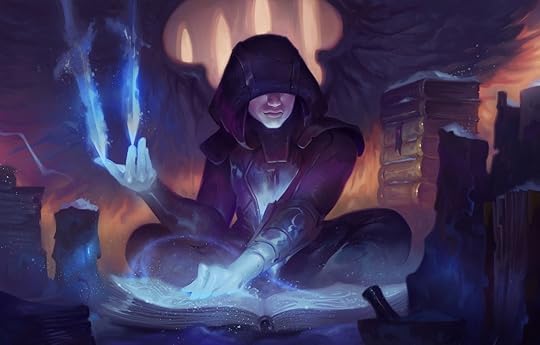


I get that this is a visual medium, and that oftentimes it's difficult to get across what is happening, especially in still images. You'll think that having no effects at all would make it too ambiguous what's going on, or the whole thing would seem boring, or all the power and majesty of sorcery might not come across.
I wholeheartedly disagree. I think that turning wizards into walking fireworks dispensers is what kills the magic quickly, not the opposite. The actual power of magic, the subtlety of true and terrifying witchcraft, drowns under the lightshow.
Witness an example of the opposite - the very first use of Force in cinema history:

Vader doesn't give a single fuck here. You can see exactly what's going on, what he's doing, and just what the implications of this thing are. Your faith will not be lacking afterwards.
And yet even this was ruined later on. For some reason I can't begin to comprehend, virtually every time someone's force-choked in comics or video games, the victim also levitates off the ground a bit. Sometimes the choke itself gets special effects, like here.

Why? What purpose does any of this carry? What does it add to the scene, or to the story? How does it make the magic (or Force, in this case) seem any scarier or more imposing than it used to be? Or is it about the whole thing being unclear - was Vader being too ambiguous earlier?
And yes, this sort of magic-use has crept along into literature as well - I probably wouldn't be talking about it here otherwise. Flashy lightshow wizards abound in books, even though they're not a visual medium at all and you'd think they could come up with better ways to describe it all. Alas.
I continue to not getting it, so up until someone clearly and concisely explains to me why virtually everyone is doing this shit, changing my mind in the most enlightening and dramatic way, my wizards will continue to be subtle. All magic use will come with the bare minimum of special effects: fireballs will burn, a blinding flash will of course be bright as hell, but there will be no blue lights or whatever surrounding the wizard as he casts.
He's not here to be flashy. He's here to get shit done with magic.

And that's the rules of magic more or less down, as I see them, barring if I come up with something else later that I forgot or neglected to address so far. It doesn't feel like there'd be much else left to discuss, though. But I've been wrong before.
Next time I'll talk about all this in practice: I've been writing a highly magical story lately, and I think it'll make for some good examples here.
I mean, nine times out of ten, when I search artwork about wizards casting spells, I get shit like this:




I get that this is a visual medium, and that oftentimes it's difficult to get across what is happening, especially in still images. You'll think that having no effects at all would make it too ambiguous what's going on, or the whole thing would seem boring, or all the power and majesty of sorcery might not come across.
I wholeheartedly disagree. I think that turning wizards into walking fireworks dispensers is what kills the magic quickly, not the opposite. The actual power of magic, the subtlety of true and terrifying witchcraft, drowns under the lightshow.
Witness an example of the opposite - the very first use of Force in cinema history:

Vader doesn't give a single fuck here. You can see exactly what's going on, what he's doing, and just what the implications of this thing are. Your faith will not be lacking afterwards.
And yet even this was ruined later on. For some reason I can't begin to comprehend, virtually every time someone's force-choked in comics or video games, the victim also levitates off the ground a bit. Sometimes the choke itself gets special effects, like here.

Why? What purpose does any of this carry? What does it add to the scene, or to the story? How does it make the magic (or Force, in this case) seem any scarier or more imposing than it used to be? Or is it about the whole thing being unclear - was Vader being too ambiguous earlier?
And yes, this sort of magic-use has crept along into literature as well - I probably wouldn't be talking about it here otherwise. Flashy lightshow wizards abound in books, even though they're not a visual medium at all and you'd think they could come up with better ways to describe it all. Alas.
I continue to not getting it, so up until someone clearly and concisely explains to me why virtually everyone is doing this shit, changing my mind in the most enlightening and dramatic way, my wizards will continue to be subtle. All magic use will come with the bare minimum of special effects: fireballs will burn, a blinding flash will of course be bright as hell, but there will be no blue lights or whatever surrounding the wizard as he casts.
He's not here to be flashy. He's here to get shit done with magic.

And that's the rules of magic more or less down, as I see them, barring if I come up with something else later that I forgot or neglected to address so far. It doesn't feel like there'd be much else left to discuss, though. But I've been wrong before.
Next time I'll talk about all this in practice: I've been writing a highly magical story lately, and I think it'll make for some good examples here.
Published on June 28, 2019 11:44
•
Tags:
disappearing-underpants, force-choke, magic, magic-systems, special-effects, subtlety, wizards
An example of my rules of magic, with Wyla Prenward
My this year's summer project is a story about magic, and wizards, and witchcraft, and a whole lot of such things. It ended up spawning all those dry long blog posts about magical rules and how I thought things should be done - I just had to get the assorted ideas down somewhere, I guess. So I think it'd be just appropriate to carry on with the theme and also fish a practical example out of the story.

Wyla Prenward, aged fourteen, lives on a farm in Hightower with her brothers and sisters, six of them older than her, and then aunts and uncles, six of them from her mother's side. This is probably why she can talk to birds - with a bit of awkward consequences, on account of a lot of that stuff being unsuitable for a toddler's ears. Then over the coming years she picks up more witchcraft, almost entirely related to farm work - on the insistence of her mother, who isn't very happy about this stuff in general. It was neither from books, like with Melker, nor by selling her soul or making deals with evil things, like with Rime: she just lives her life, tries to figure things out, and the world around her will give her the answers. She's got talent: magic is in her blood.
So she knows how to plant and harvest stuff, how to fix broken things, how to tell weather, how to take care of animals, how to butcher them for meat, cooking, sewing, milling, and all other such things. She actually has absolutely no idea how to do most of these without magic: she just casts the spells, sings the songs and does the handiwork, and her heart will tell her what to do. It's basically shortcuts, and the very subtle sort: if you're not paying attention, you could well imagine that no magic is used at all, and that she's just really good at this stuff. But she's yet unsatisfied, and always on the lookout for more magic, more power, more fame.
That's rules one and four, in case you weren't counting.
Rule two - she's the only witch anyone around the area knows about, and the only fantastic fairytale element for that matter. She's discontent because her family - according to her at least - takes her skill for granted and aren't showering her in enough praise; and the folk of a nearby village just think she's the child of a demon or some shit and would be happy to see her gone forever. None of them really understand her, she feels. As such she is driven to step beyond the borders, to the fantastic and the unknown, where she discovers a whole new world of magic and adventure. That's when it gets weird for her.
And the rule three? Oh, that doesn't seem like much for her: all she thinks it does, the magic, is make her a little tired. She basically equates it to a quick jog around the woods or something else exhausting but satisfying. And for that matter, she's firmly on the opinion that there's no reason to not use magic to solve a problem if you can: why do something the boring and inadequate mundane way, when a little bit of sorcery will deal with it faster and more convenient?
She will know better by the end of this.
Oh, and Peal is there too. You can see him in the picture above as well, after all. This entire adventure takes place a good thirty years after The Straggler's Mask: by this time he's fully become a part of the land of adventure, the very opposite of mundane. He's basically there to make sure Wyla doesn't get into too much trouble.
He will fail.
Also, a couple talking bird buddies. The fowl in her hands is named Acapon. Think about that for a moment.
On the whole, I have a fairly good feeling about this story. There's a girl with too much magic and too little maturity, a realm of adventure and fantasy outside the world of the known, a mentor, and a whole bucketful of harsh lessons to come. We'll see if she can keep up with that cheerful smile of hers.
(Picture credit: Rebecca Tasic)

Wyla Prenward, aged fourteen, lives on a farm in Hightower with her brothers and sisters, six of them older than her, and then aunts and uncles, six of them from her mother's side. This is probably why she can talk to birds - with a bit of awkward consequences, on account of a lot of that stuff being unsuitable for a toddler's ears. Then over the coming years she picks up more witchcraft, almost entirely related to farm work - on the insistence of her mother, who isn't very happy about this stuff in general. It was neither from books, like with Melker, nor by selling her soul or making deals with evil things, like with Rime: she just lives her life, tries to figure things out, and the world around her will give her the answers. She's got talent: magic is in her blood.
So she knows how to plant and harvest stuff, how to fix broken things, how to tell weather, how to take care of animals, how to butcher them for meat, cooking, sewing, milling, and all other such things. She actually has absolutely no idea how to do most of these without magic: she just casts the spells, sings the songs and does the handiwork, and her heart will tell her what to do. It's basically shortcuts, and the very subtle sort: if you're not paying attention, you could well imagine that no magic is used at all, and that she's just really good at this stuff. But she's yet unsatisfied, and always on the lookout for more magic, more power, more fame.
That's rules one and four, in case you weren't counting.
Rule two - she's the only witch anyone around the area knows about, and the only fantastic fairytale element for that matter. She's discontent because her family - according to her at least - takes her skill for granted and aren't showering her in enough praise; and the folk of a nearby village just think she's the child of a demon or some shit and would be happy to see her gone forever. None of them really understand her, she feels. As such she is driven to step beyond the borders, to the fantastic and the unknown, where she discovers a whole new world of magic and adventure. That's when it gets weird for her.
And the rule three? Oh, that doesn't seem like much for her: all she thinks it does, the magic, is make her a little tired. She basically equates it to a quick jog around the woods or something else exhausting but satisfying. And for that matter, she's firmly on the opinion that there's no reason to not use magic to solve a problem if you can: why do something the boring and inadequate mundane way, when a little bit of sorcery will deal with it faster and more convenient?
She will know better by the end of this.
Oh, and Peal is there too. You can see him in the picture above as well, after all. This entire adventure takes place a good thirty years after The Straggler's Mask: by this time he's fully become a part of the land of adventure, the very opposite of mundane. He's basically there to make sure Wyla doesn't get into too much trouble.
He will fail.
Also, a couple talking bird buddies. The fowl in her hands is named Acapon. Think about that for a moment.
On the whole, I have a fairly good feeling about this story. There's a girl with too much magic and too little maturity, a realm of adventure and fantasy outside the world of the known, a mentor, and a whole bucketful of harsh lessons to come. We'll see if she can keep up with that cheerful smile of hers.
(Picture credit: Rebecca Tasic)
Published on July 01, 2019 14:57
•
Tags:
birds, farming, magic, magic-systems, peal, rules, wizards, wyla-prenward
Wildcard Rule of Magic: Careful with Christ
First noticing with King of Elfland's Daughter, now reaffirmed by The Broken Sword, I think this is worth noting down: you could make magic as whimsical and unknowable as it gets and I might still judge it too harshly - all thanks to our good Judean boy.

It'd be something of an addendum to the first rule, I suppose, about sciences and analyzing and quantifying, about the universe around us imposing itself to the sorcerer. It's not a hard-and-fast type of rule magic like Alchemy or Allomancy or what have you, though - it's more of an underlying implication underneath, an invisible rot that sets out to put all fantasy into decay.
Faith magic can on its own be as mysterious and unknowable, as wondrous and fantastic, as-
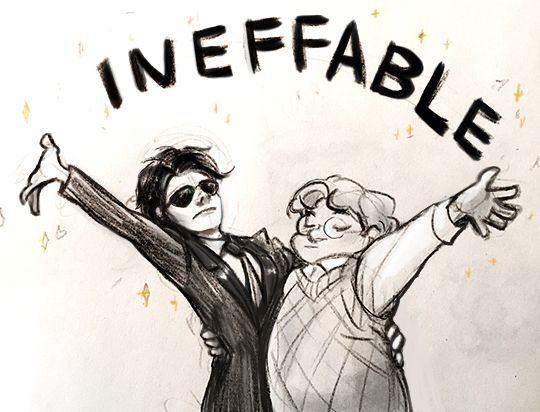
-as the best magic system out there... but at the end of the day, it all still relies on the premise of one true God, the creator of the world, the high being, omnipotent and omnipresent and omnieverything. The child outside the sandbox. And this being, by its very definition, always stands superior. Any other type of magic and monsters and fantasy will have their roots on pagan gods or outright devil worship, will always lose in the end - and is but an inferior shadow of the true path, trickery and lies, foolish, childish even. This kills a lot of the appeal for me.
Many other old faiths of the world - Hinduism, Greek and Norse Pantheons, etc. - don't have this issue, on account of the more polytheic nature and their capability of coexisting peacefully. They each have their version of the story of Earth's birth, how it all came to being, and you're free to come to your own conclusion and sacrifice to whichever daity you like. But Yahweh is a jealous one, and suffers no other gods or truths.

With brutal efficiency, He and His disciples set out to the world to reshape it all in their image. Pan, Loki, and Perkele, among many others - once perfectly fine and respectable deities - ended up as nothing more than an aspect of Lucifer Morningstar. Others, such as Brigid, were reduced in power to Saints, each subservient to the Lord. He is the one above all, and so His magic is above all other magic and fantasy.
Both Elfland's Daughter and Broken Sword seem to be taking this for granted. C.S. Lewis sinks deep into the same pitfall by his heavy use of allegory. Even the Vertigo line of comic books holds this as a truth, though it has other sets of gods as well. Other works can avoid the trap, but they'd typically have to go out on their way to establish Christianity as just another belief among the others, no inherently better or more truthful: the automatic assumption seems to be that if Jesus and God are out there, then they're the best and the highest. Watch yourself among them.

The Broken Sword is still a great book, though.

It'd be something of an addendum to the first rule, I suppose, about sciences and analyzing and quantifying, about the universe around us imposing itself to the sorcerer. It's not a hard-and-fast type of rule magic like Alchemy or Allomancy or what have you, though - it's more of an underlying implication underneath, an invisible rot that sets out to put all fantasy into decay.
Faith magic can on its own be as mysterious and unknowable, as wondrous and fantastic, as-

-as the best magic system out there... but at the end of the day, it all still relies on the premise of one true God, the creator of the world, the high being, omnipotent and omnipresent and omnieverything. The child outside the sandbox. And this being, by its very definition, always stands superior. Any other type of magic and monsters and fantasy will have their roots on pagan gods or outright devil worship, will always lose in the end - and is but an inferior shadow of the true path, trickery and lies, foolish, childish even. This kills a lot of the appeal for me.
Many other old faiths of the world - Hinduism, Greek and Norse Pantheons, etc. - don't have this issue, on account of the more polytheic nature and their capability of coexisting peacefully. They each have their version of the story of Earth's birth, how it all came to being, and you're free to come to your own conclusion and sacrifice to whichever daity you like. But Yahweh is a jealous one, and suffers no other gods or truths.

With brutal efficiency, He and His disciples set out to the world to reshape it all in their image. Pan, Loki, and Perkele, among many others - once perfectly fine and respectable deities - ended up as nothing more than an aspect of Lucifer Morningstar. Others, such as Brigid, were reduced in power to Saints, each subservient to the Lord. He is the one above all, and so His magic is above all other magic and fantasy.
Both Elfland's Daughter and Broken Sword seem to be taking this for granted. C.S. Lewis sinks deep into the same pitfall by his heavy use of allegory. Even the Vertigo line of comic books holds this as a truth, though it has other sets of gods as well. Other works can avoid the trap, but they'd typically have to go out on their way to establish Christianity as just another belief among the others, no inherently better or more truthful: the automatic assumption seems to be that if Jesus and God are out there, then they're the best and the highest. Watch yourself among them.

The Broken Sword is still a great book, though.
Published on July 11, 2019 10:48
•
Tags:
christianity, human-condition, magic, magic-systems, pet-peeves, philosophy, religion, tribalism
Ye Olde Useless Magick
Imagine questing for an ancient spell of awesome power, overcoming many dangerous trials and perils, one of your friends even sacrificing his life to break the seal. Then at last you get to whip out this planet-buster against the Dark Lord. And you find that it has all the power of a wet fart.
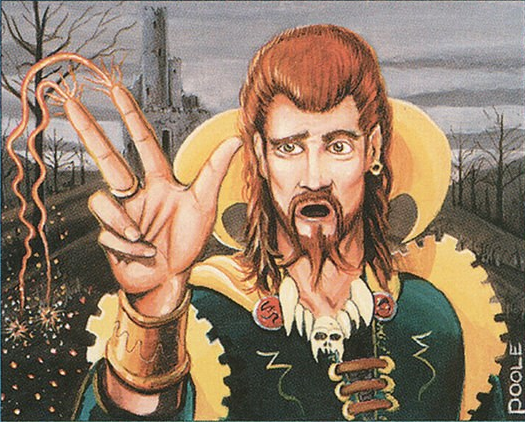
This is the predicament that the players of the 1988 Final Fantasy II found themselves in. The fabled Ultima spell, sealed away in the ancient days for its world-shattering potential, turned out to be effectively useless. Even the Emperor's mooks could pretty safely survive even a higher-level blast. The whole plotline was dropped just about as you learned the spell, and you never once need to actually cast it. Poor Minwu died for naught.
Allegedly we have one of the programmers to thank for this: he figured that such an old and outdated spell simply could not stand relevant in the face of newer and more refined techniques. That magic would naturally have advanced leaps and bounds in the many ages since Ultima had ruled the earth, and that even a simple fire spell, taken for granted by young wizards of today, could match or even overshadow it. Imagine Greek Fire, a deadly secret weapon of antiquity, pitted against modern bomber plane with a cargo hold full of napalm. You can't really argue with that.
Yet argue with it I shall!
Yes, cars get faster and safer, life-saving medicine more reliable, and communication devices more sophisticated. Technology improves. Science marches on. Problem is, as me and many others have elsewhere argued, magic is not science. It's pretty much the polar opposite of technology. Magic is art. And with art, I'm sad to say that these past few decades, if anything, we've regressed.
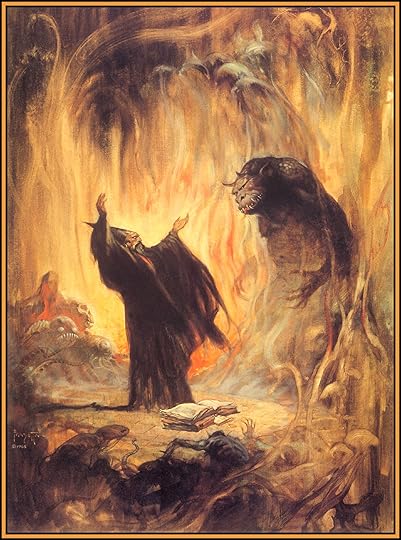
Art is hard work. Blood and sweat and tears. Cunning and problem-solving. Focus and desire. Patience and sacrifice. Whatever your canvas - paper, notepad, piece of code, circle of summoning, artifact of doom - you're pouring your soul onto it for all to see. Your anger and frustration, your depression and self-doubts, it's all fuel in the fires of creation. You rack your brain to figure out how it all comes together, and get real inventive to pull off things no one else ever has. You need to be conservative with what you put in, and lean into your limitations, turn them into advantages.
You wouldn't even have started if you didn't think it would be worth it. You won't ever give up until it's perfect and just right. Every hardship you face, every hurdle, even the tiniest of chores and errands and maintenance, only serves to fuel your determination and conviction and keep you focused on the task. And the harder the road, the more rewarding it is when you reach the end - the greater the end result, and the greater the lessons you've learned of your craft, of life, of yourself.
And technology gets in the way of that. It makes things easier, and this is one place in the world where this should not happen. It's like putting an escalator up a tall mountain road. Sure, the view's still great, but it doesn't feel the same way. You don't feel any ache or pain and your muscles didn't grow at all. It's not an adventure anymore, you could've just gone up there on a whim.
True enough, typing up a whole book is still pretty tough, even on a computer. There's still effort and great lessons and the beautiful sense of accomplishment, none of that has gone anywhere. Even to this day, great fantasies and biographies let us marvel the souls and blood of their authors.
 ut how's your handwriting doing? Wouldn't it just look so much grander with your own personal style of calligraphy and fancy medieval illuminations? Can you manage anything better than chicken-scratches now, since our whole society, including the work of art, gives no incentive to do such things anymore? And if you had a story in mind that truly deserved such attention - one you wanted to go the extra mile for - just what kind of an amazing fantasy would it have to be?
ut how's your handwriting doing? Wouldn't it just look so much grander with your own personal style of calligraphy and fancy medieval illuminations? Can you manage anything better than chicken-scratches now, since our whole society, including the work of art, gives no incentive to do such things anymore? And if you had a story in mind that truly deserved such attention - one you wanted to go the extra mile for - just what kind of an amazing fantasy would it have to be?
It's the same story all over. There's a reason most of us prefer practical effects over CGI, real costumes and camera tricks and big-ass model castles; a reason the first Jaws movie was a classic, the shoddy and uncooperative shark prop turned into a great advantage, when in the modern day that'd have thrown the big computer-monster front and center in every shot and ruined the whole thing. Even the new Puss In Boots movie, beautiful as it is, obvious as it is that its creators cared and put their heart into it and came up with all these new effects and tricks, it still can't hold a candle to AKIRA that came out decades in the past. And the modern plague of noodle-handed bean-mouths, cheap and simple to do, are widely and justly mocked.
And now the AI. Now at last, with the arrival of the great apocalyptic beasts GPT and Midjourney, all effort can be excised. All thought can be put away, all cunning snuffed out, all uniqueness made cheaply available everywhere, all meaning lost. I envision a dark age for all art unlike any we've seen ever before, even in the days of Comics Code.

Where was I? Oh, right, magic.
Yeah, I could see magic work about the same way. Over the generations - centuries, millennia - inventive and pioneering sorcerers would refine the spellcraft, make it easier to handle, cheaper to cast, quicker, more manageable, more potent. They'd learn new techniques, delve in new dimensions, uncover new realms. Write down names of new and more powerful cosmic entities. Promise their souls to stronger gods. Craft more sophisticated artifacts and channelling tools. Brew stronger potions. You get the idea. They might never truly tame the stuff - never get to the realm of the much-maligned Magic Systems - but they'll hone their craft to such efficiency as it is possible.
Before long even children can learn simple spells, and cast fireworks without risking to blow up their heads in the backlash. Perhaps not quite everyone can learn it, now or ever, but still, it'll seep into every aspect of this magical society.
The old ways are forgotten. Who, in this day and age, would ever bother spending all night dancing under the full moon? Who would want to risk an explosive miscast, when we can now avoid such things? Why would you still beseech this god, when it's known its power in our world is almost lost? Are you really crafting your own wand?
But this is magic. The realm of mystery and wonder, of fantasy and terrible, terrible might. Not all that is lost is worthless; not all that is outdated is entirely without power. And the more careful you need to be with it, the more preparations and precautions you need, the more it will teach you in turn. And if you're so absolutely convinced that you have to eschew the new and more reliable methods in favour of the old stuff, if you must risk your life in a way no wizard in ages has had to, if you must have your own meticulously handcrafted wand, if you must spend all night out in the cold, if you must go the hard way, tread a thorny path thought cleared millennia ago... well, then you probably have a damned good reason for it, and I'm not going to argue with that. Instead, I think I'll run the hell away.
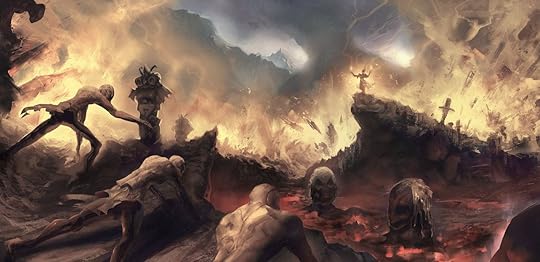
All these weak-ass ponce conjurers, when they see an old madman begin dance the old dance, they better hit the deck. Shit is about to get real.

This is the predicament that the players of the 1988 Final Fantasy II found themselves in. The fabled Ultima spell, sealed away in the ancient days for its world-shattering potential, turned out to be effectively useless. Even the Emperor's mooks could pretty safely survive even a higher-level blast. The whole plotline was dropped just about as you learned the spell, and you never once need to actually cast it. Poor Minwu died for naught.
Allegedly we have one of the programmers to thank for this: he figured that such an old and outdated spell simply could not stand relevant in the face of newer and more refined techniques. That magic would naturally have advanced leaps and bounds in the many ages since Ultima had ruled the earth, and that even a simple fire spell, taken for granted by young wizards of today, could match or even overshadow it. Imagine Greek Fire, a deadly secret weapon of antiquity, pitted against modern bomber plane with a cargo hold full of napalm. You can't really argue with that.
Yet argue with it I shall!
Yes, cars get faster and safer, life-saving medicine more reliable, and communication devices more sophisticated. Technology improves. Science marches on. Problem is, as me and many others have elsewhere argued, magic is not science. It's pretty much the polar opposite of technology. Magic is art. And with art, I'm sad to say that these past few decades, if anything, we've regressed.

Art is hard work. Blood and sweat and tears. Cunning and problem-solving. Focus and desire. Patience and sacrifice. Whatever your canvas - paper, notepad, piece of code, circle of summoning, artifact of doom - you're pouring your soul onto it for all to see. Your anger and frustration, your depression and self-doubts, it's all fuel in the fires of creation. You rack your brain to figure out how it all comes together, and get real inventive to pull off things no one else ever has. You need to be conservative with what you put in, and lean into your limitations, turn them into advantages.
You wouldn't even have started if you didn't think it would be worth it. You won't ever give up until it's perfect and just right. Every hardship you face, every hurdle, even the tiniest of chores and errands and maintenance, only serves to fuel your determination and conviction and keep you focused on the task. And the harder the road, the more rewarding it is when you reach the end - the greater the end result, and the greater the lessons you've learned of your craft, of life, of yourself.
And technology gets in the way of that. It makes things easier, and this is one place in the world where this should not happen. It's like putting an escalator up a tall mountain road. Sure, the view's still great, but it doesn't feel the same way. You don't feel any ache or pain and your muscles didn't grow at all. It's not an adventure anymore, you could've just gone up there on a whim.
True enough, typing up a whole book is still pretty tough, even on a computer. There's still effort and great lessons and the beautiful sense of accomplishment, none of that has gone anywhere. Even to this day, great fantasies and biographies let us marvel the souls and blood of their authors.
 ut how's your handwriting doing? Wouldn't it just look so much grander with your own personal style of calligraphy and fancy medieval illuminations? Can you manage anything better than chicken-scratches now, since our whole society, including the work of art, gives no incentive to do such things anymore? And if you had a story in mind that truly deserved such attention - one you wanted to go the extra mile for - just what kind of an amazing fantasy would it have to be?
ut how's your handwriting doing? Wouldn't it just look so much grander with your own personal style of calligraphy and fancy medieval illuminations? Can you manage anything better than chicken-scratches now, since our whole society, including the work of art, gives no incentive to do such things anymore? And if you had a story in mind that truly deserved such attention - one you wanted to go the extra mile for - just what kind of an amazing fantasy would it have to be?It's the same story all over. There's a reason most of us prefer practical effects over CGI, real costumes and camera tricks and big-ass model castles; a reason the first Jaws movie was a classic, the shoddy and uncooperative shark prop turned into a great advantage, when in the modern day that'd have thrown the big computer-monster front and center in every shot and ruined the whole thing. Even the new Puss In Boots movie, beautiful as it is, obvious as it is that its creators cared and put their heart into it and came up with all these new effects and tricks, it still can't hold a candle to AKIRA that came out decades in the past. And the modern plague of noodle-handed bean-mouths, cheap and simple to do, are widely and justly mocked.
And now the AI. Now at last, with the arrival of the great apocalyptic beasts GPT and Midjourney, all effort can be excised. All thought can be put away, all cunning snuffed out, all uniqueness made cheaply available everywhere, all meaning lost. I envision a dark age for all art unlike any we've seen ever before, even in the days of Comics Code.

Where was I? Oh, right, magic.
Yeah, I could see magic work about the same way. Over the generations - centuries, millennia - inventive and pioneering sorcerers would refine the spellcraft, make it easier to handle, cheaper to cast, quicker, more manageable, more potent. They'd learn new techniques, delve in new dimensions, uncover new realms. Write down names of new and more powerful cosmic entities. Promise their souls to stronger gods. Craft more sophisticated artifacts and channelling tools. Brew stronger potions. You get the idea. They might never truly tame the stuff - never get to the realm of the much-maligned Magic Systems - but they'll hone their craft to such efficiency as it is possible.
Before long even children can learn simple spells, and cast fireworks without risking to blow up their heads in the backlash. Perhaps not quite everyone can learn it, now or ever, but still, it'll seep into every aspect of this magical society.
The old ways are forgotten. Who, in this day and age, would ever bother spending all night dancing under the full moon? Who would want to risk an explosive miscast, when we can now avoid such things? Why would you still beseech this god, when it's known its power in our world is almost lost? Are you really crafting your own wand?
But this is magic. The realm of mystery and wonder, of fantasy and terrible, terrible might. Not all that is lost is worthless; not all that is outdated is entirely without power. And the more careful you need to be with it, the more preparations and precautions you need, the more it will teach you in turn. And if you're so absolutely convinced that you have to eschew the new and more reliable methods in favour of the old stuff, if you must risk your life in a way no wizard in ages has had to, if you must have your own meticulously handcrafted wand, if you must spend all night out in the cold, if you must go the hard way, tread a thorny path thought cleared millennia ago... well, then you probably have a damned good reason for it, and I'm not going to argue with that. Instead, I think I'll run the hell away.

All these weak-ass ponce conjurers, when they see an old madman begin dance the old dance, they better hit the deck. Shit is about to get real.
Published on July 07, 2023 13:19
•
Tags:
ai, art, forgotten, magic, magic-systems, outdated, progress, science, technology
Pankarp
Pages fallen out of Straggler's journal, and others.
Pages fallen out of Straggler's journal, and others.
...more
- Juho Pohjalainen's profile
- 352 followers



